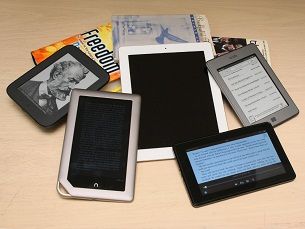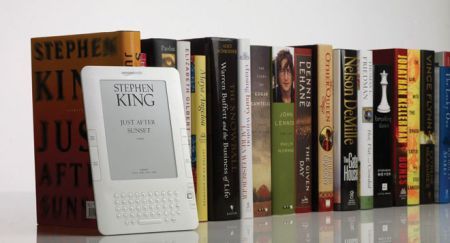
Publisher:
Bonnie King
CONTACT:
Newsroom@Salem-news.com
Advertising:
Adsales@Salem-news.com

~Truth~
~Justice~
~Peace~
TJP
Sep-02-2012 16:43

 TweetFollow @OregonNews
TweetFollow @OregonNews
A New Chapter in Publishing
Dr. Paul Balles Salem-News.comDigital books save rain forests.
 Digital books are opening a whole new world for readers |
(MANAMA, Bahrain) - Flip-flop is a term applied to describe what politicians do when they change their minds about a political issue.
Rarely do academics flip-flop about the issues they teach or the material they use. I'm an academic about to do just that.
Five years ago, I started an article arguing: "Not many people would read a novel online. For that matter, few would want to read an entire book on any subject on a computer screen. Why then, you might wonder, are more and more books coming online?"
The reason why more books are coming online is now clear: many people now read digital books.
As author and sociology professor John B. Thompson writes, "The technological upheaval associated with the digital revolution is now having a major impact on the book publishing business. After a decade of numerous false dawns, e-books have now arrived and they are here to stay."
Adds Thompson " In 2006, e-book sales amounted to only around 0.1 percent... Today this figure is around 20 percent, and for some kinds of books, like romance, science fiction and thrillers, the percentage can be 60 percent or more - a huge change in five years."
Part of the reason for my flip-flop about reading books online comes from the changes in electronic technology during the past five years.
Five years ago, the only reliable technology for reading books with a computer involved downloading books that had been translated into a .pdf (Portable Document Format by Adobe) or an MS Word document.
Now numerous other formats make downloading books or reading them online easy, inexpensive and enjoyable.
Comments Thompson, "The digital revolution is disrupting many of the traditional practices of the publishing industry, opening up new opportunities and at the same time threatening to dislodge some of the players who have shaped the business of book publishing for half a century or more."
Many people are now asking if we're approaching an era of electronic and digitalized books replacing print copies.
The last five years have seen more changes in publishing than in the five centuries after the invention of the Gutenberg press.
Between 1935 and 1940, the publishing industry slowly introduced paperback books, the only major development in book publishing since 1450.
The changes taking place during the past five to ten years have been dramatic. From print to digital e-books is the best description of the most significant development in how we read.
As one might expect, booksellers now do business online, with Amazon and Barnes & Noble leading the pack. Their digital readers—Kindle and Nook—make digital reading a pleasure.
Amazon caught on to an idea that a Syrian friend who owned a bookshop understood at least 25 years ago. Every time a film based on a book came out, my friend would order many more copies of the book than he would ordinarily. He knew that people would buy the book after seeing the film.

Now, Amazon has decided to make the text of books they're selling available for online reading. The CEO, Jeff Bezos, understands the principle that my friend knew: many people who enjoy reading a digital book will buy a print copy of it.
One prediction based on that principle has a greater probability of coming true: good books and magazines in print will not disappear because of digital books.
A print copy of a book may be destroyed by a hurricane, a tornado or fire, but it will never be lost because the computer crashes or from an accidental delete.
Digital books save rain forests.

Throughout his life as an educator, Dr. Paul J. Balles, a retired American university professor and freelance writer, has lived and worked in the Middle East for 40 years - first as an English professor (Universities of Kuwait and Bahrain), and for the past ten years as a writer, editor and editorial consultant.
He’s a weekly Op-Ed columnist for the GULF DAILY NEWS . Dr. Balles is also Editorial Consultant for Red House Marketing and a regular contributor to Bahrain This Month. He writes a weekly op-ed column for Akbar Al Khaleej (Arabic). He has also edited seven websites, including bahrainthismonth.com, womenthismonth.com
Paul has had more than 350 articles published, focusing on companies, personality profiles, entrpreneurs, women achievers, journalists and the media, the Middle East, American politics, the Internet and the Web, consumer reports, Arabs, diplomats, dining out and travel. Paul's articles on Salem-News.com are frank and enlightening. We are very appreciative of the incredible writings Dr. Balles has generated for our readers over the years, and we are very pleased to list him among our most valued contributors.
Indulging the hard subjects that keep the world divided is our specialty at Salem-News.com, and with writers like Dr. Paul Balles on our team, we amplify our ability to meet challenges and someday, will see the effects of this exist in context with a more peaceful and generally successful world.
 |
 |
 |
 |
 |
 |
 |
Articles for September 1, 2012 | Articles for September 2, 2012 | Articles for September 3, 2012





googlec507860f6901db00.html
Terms of Service | Privacy Policy
All comments and messages are approved by people and self promotional links or unacceptable comments are denied.
[Return to Top]
©2026 Salem-News.com. All opinions expressed in this article are those of the author and do not necessarily reflect those of Salem-News.com.